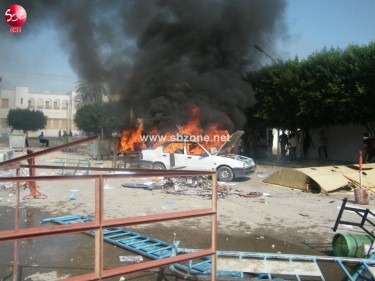This post is part of our special coverage Tunisia Revolution 2011.
October 23, 2011, was another historic turning point for Tunisia, the birthplace of the so-called Arab Spring. It was election day, and for the first time Tunisians freely elected their representatives who will form a national constituent assembly which will draft the country's constitution.
The moderate Islamist party, Ennahdha won 90 out of 217 seats at the assembly (that is 41.47% of the votes). The centre-left secular Congress for the Republic came second with 30 seats, followed by Democratic Forum for Labor and Liberties, a social democratic party, which gained 22 seats at the assembly.
European Union observers declared that the election “met international standards.” However, not everyone in Tunisia is satisfied with the results.
Indeed, in Sidi Bouzid, where the protests movement which overthrew ousted president Zeine El Abidine Ben Ali kicked off, demonstrators took to the streets to protest against the disqualification of a number of seats previously attributed to an independent list called ‘”the Popular Petition.”
The independent commission claims that the disqualification came over campaign finance violations. Before the disqualification, provisional results had suggested that the ”popular petition” won most of the votes in Sidi Bouzid. Despite the disqualification, the popular petition led by Hechmi Hamdi, an outspoken supporter of the former regime, won 19 seats at the assembly.
On Twitter, netizens were left with questions [fr]:
@OBergervdn: #SidiBouzid, symbole de la révolution, a donc voté pour les anciens Benalistes d'Aridha. Ironique, non ? #tnelec
The post election protests in Sidi Bouzid were shaped by violence, vandalism, and riots. Tunisia Live tweeted on the night of October 27, when the results were officially released, tweeted:
Large protests in #SidiBouzid #roadblocks tires burning. People shouting “the revolution is ours and you can't take it from us” #tnelec
Titof explains [ar] why the protesters in Sidi Bouzid reacted that way:
Police used tear gas to disperse the angry protesters. Calm returned to Sidi Bouzid on Saturday, and the residents launched a cleaning campaign.
Meanwhile, Tunisian bloggers expressed their anger about foreign media coverage of the elections, mainly the Islamist party winning the biggest share of the votes.
@Psycke tweets [fr]:
Je suis révoltée par les titres de la presse française auj! Arrêtez de projeter votre peur sur nous!!!!!!! #tnelec #Tunisie
”You did not see the Dictator. Now, you see the Islamists”, was the message of the blogger Azyz Amamy (@azyyoz) to Western media.
The violence that almost tarnished the country's historic election, and the Western media's coverage of the election and viewed as unfair by many Tunisians, did not stop some bloggers from expressing their satisfaction about the election, and their optimism for a better future.
L'exception tunisienne writes [fr]:
La droite conservatrice remporte la mise. Mais le plus grand gagnant dans tout cela, c'est le peuple tunisien qui est sorti en masse et d'une manière spontanée et volontaire pour dire son mot
Olfa too has an optimistic vision for Tunisia [fr]:
Ennahda a été élu démocratiquement : il faut lui donner une chance. […]A regarder le chemin parcouru, cependant, je considère que l'avenir qui s'offre à la Tunisie est non pas une menace, mais une chance. La société tunisienne est depuis longtemps sécularisée et n’a pas l’intention de céder sur ses acquis, notamment en matière de droits des femmes. Je reste donc optimiste !
This post is part of our special coverage Tunisia Revolution 2011.









11 comments